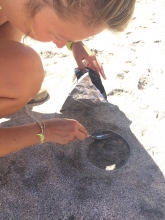
By: Dr. Stefanie Whitmire, Guest Blogger and Research Scientist at the Baruch Institute of Coastal Ecology & Forest Science, Clemson University
Microplastics are plastic pieces measuring less than five millimeters in size and in recent decades, there have been many studies that indicate a strong presence of this type of debris in marine and coastal environments. Microplastics can come from a variety of sources. Some microplastics are manufactured at that small size as microbeads, found in products like toothpaste and facial scrubs, or pellets, which are used to make larger plastic items. Microfibers, another type of microplastic debris, come from synthetic items such as rope or clothing (like fleece). Microplastics also come from the breakdown of larger plastic pieces, such as water bottles and fishing line. To investigate the number and distribution of microplastics on National Park beaches across the Unites States, researchers at Clemson University collaborated with the National Park Service to collect and analyze sand from 37 coastal National Parks.